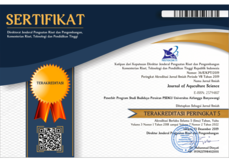The Influence of Economic and Entrepreneurial Environmental Factors on Coffee Farming Performance in Banyuwangi Regency
Downloads
The plantation sector is a sector that plays a role in the country's foreign exchange earnings. One of the foreign exchange-producing plantation commodities is coffee. In 2011, foreign exchange earnings from coffee commodities resulted in an export value of US$ 1,085.89 million or 10.1% of the export value of all agricultural commodities, or 0.5% of non-oil and gas exports or 0.4% of the total export value. To increase coffee productivity both in quality and quantity, it is necessary to improve the economic environment and also have the entrepreneurial competence of coffee farmers. The purpose of this study was to analyze the influence of the economic environment and entrepreneurship on-farm performance. This research was carried out in Banyuwangi Regency which was carried out purposively with the research population being coffee farmers who had a coffee area of 0.5 - 1 Ha. The results of the study show that the economic environment has a positive effect on entrepreneurship as a result, the better the economic environment, the better the entrepreneurship of farmers. The economic environment does not directly affect the performance of coffee farming but has a direct effect on farmer entrepreneurship. Entrepreneurship has a positive effect on farm performance, as a result, the better the farmer's entrepreneurship, the better his farming performance.
Keywords: Economic Environmental Factors, Entrepreneurship, Farming Performance, Coffee
Asosiasi Kopi Spesial Indonesia. 2010. The 1st Indonesia Specialty Coffee Auction, Bali, 9-10 October 2010. http://www.sca-indo.org [diakses 5 Desember 2019]
Ambarsari, Arum; Sri Widodo dan Sutrilah. 2004. Studi komparatif usahatani kopi robusta organik dengan nonorganik di Kecamatan Samigaluh Kabupaten Kulonprogo. Agrosains, 17 (1): 143-155
Casson M, Yeung B, Basu A, dan Wadeson N. 2006. The Oxford Handbook of Enterprneurship. New York (US): Oxford University Press
Direktorat Jenderal Perkebunan. 2011. Luas areal dan produksi perkebunan seluruh Indonesia menurut provinsi dan status pengusahaan: komoditas kopi. http://www.ditjenbun. go.id [diakses 4 Januari 2010]
Dradjat, Bambang; Adang Agustian, dan Ade Supriatna. 2007. Ekspor dan daya saing kopi biji Indonesia di pasar internasional: implikasi strategis bagi pengembangan kopi biji organik. Pelita Perkebunan 23 (2): 139-159.
Hadiyati, E. (2011). Kreativitas dan inovasi berpengaruh terhadap kewirausahaan usaha kecil. Jurnal Manajemen Dan Kewirausahaan. Journal of Management and Entrepreneurship, 13(1): 8-16.
Priyanto SH. 2009. Mengembangkan Pendidikan Kewirausahaan di Masyarakat. Jurnal PNFI, 1(1): 57-82.
Puspitasri. 2013. Pengaruh perilaku kewirausahaan Petani anggrek terhadap kinerja usaha: Kasus di Kecamatan Gunung Sindur dan Parung, Kabupaten Bogor,dan Kecamatan Serpong, Kota Tangerang Selatan..
Saragih B. 2010. Agribisnis: Paradigma Baru Pembangunan Ekonomi Berbasis Pertanian. PT. Penerbit IPB Press, Bogor
Yusnadi.1992. Adopsi Petani Kopi dalam Pengembangan Perkebunan Kopi Rakyat [Tesis]. Bogor (ID): Institut Pertanian Bogor.



















